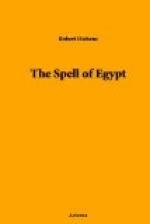In the east I saw an effect. To the west I turned for the cause. The sunset light was returning. Horus would not permit Tum to reign even for a few brief moments, and Khuns, the sacred god of the moon, would be witness of a conflict in that lovely western region of the ocean of the sky where the bark of the sun had floated away beneath the mountain rim upon the red-and-orange tides. The afterglow was like an exquisite spasm, is always like an exquisite spasm, a beautiful, almost desperate effort ending in the quiet darkness of defeat. And through that spasmodic effort a world lived for some minutes with a life that seemed unreal, startling, magical. Color returned to the sky—color ethereal, trembling as if it knew it ought not to return. Yet it stayed for a while and even glowed, though it looked always strangely purified, and full of a crystal coldness. The birds that flew against it were no longer birds, but dark, moving ornaments, devised surely by a supreme artist to heighten here and there the beauty of the sky. Everything that moved against the afterglow—man, woman, child, camel and donkey, dog and goat, languishing buffalo, and plunging horse—became at once an ornament, invented, I fancied, by a genius to emphasize, by relieving it, the color in which the sky was drowned. And Khuns watched serenely, as if he knew the end. And almost suddenly the miraculous effort failed. Things again revealed their truth, whether commonplace or not. That pool of the Nile was no more a red jewel set in a feathery pattern of strange design, but only water fading from my sight beyond a group of palms. And that below me was only a camel going homeward, and that a child leading a bronze-colored sheep with a curly coat, and that a dusty, flat-roofed hovel, not the fairy home of jinn, or the abode of some magician working marvels with the sun-rays he had gathered in his net. The air was no longer thrilling with music. The breast that had heaved with a divine breath was still as the breast of a corpse.
And Khuns reigned quietly over the plains of Karnak.
Karnak has no distinctive personality. Built under many kings, its ruins are as complex as were probably once its completed temples, with their shrines, their towers, their courts, their hypo-style halls. As I looked down that evening in the moonlight I saw, softened and made more touching than in day-time, those alluring complexities, brought by the night and Khuns into a unity that was both tender and superb. Masses of masonry lay jumbled in shadow and in silver; gigantic walls cast sharply defined gloom; obelisks pointed significantly to the sky, seeming, as they always do, to be murmuring a message; huge doorways stood up like giants unafraid of their loneliness and yet pathetic in it; here was a watching statue, there one that seemed to sleep, seen from afar. Yonder Queen Hatshepsu, who wrought wonders at Deir-el-Bahari, and who is more familiar perhaps as Hatasu, had left




